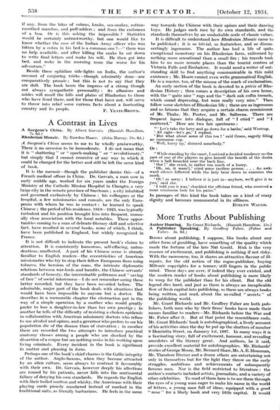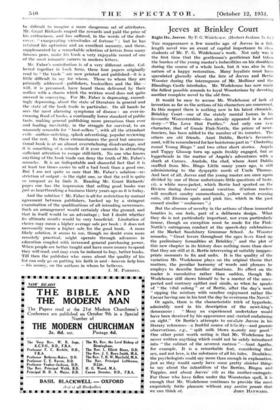More Truths About Publishing
BOOKS about publishing, I suppose, like books about any other form of gambling, have something of the quality which made the fortune of the late Nat Gould. Risk is the very essence of excitement, and publishing is nothing if not risky. With the racecourse, too, it shares an attractive flavour of ill- repute, for the old notion of the rogue-publisher, buying hliltonic copyrights for a tenner,- still lingers in the public mind. Those days are over, if indeed they ever existed, and the modern reader of books about publishing is more likely to weep for the publisher than for his -client. But the old legend dies hard, and just as there is always an inexplicable flow of fresh capital into publishing, so there are always books being written, and read, about the so-called " secrets " of the publishing world. - Mr. Grant Richards and Mr. Geoffrey Faber are both pub- lishers, both men who by their firms' books have made their names familiar to readers—Mr. Richards before the War and Mr. Faber after it. But at that point the resemblance ends. Mr. Grant Richards' book is autobiographical, a lively account of his activities since the day he put up the shutters of number' 9 Henrietta Street, on January 1st, 1897. In many ways it is a fascinating story, full of excitement, humour, and revealing anecdotes of the literary great. And authors, be it said, provide excellent material for autobiographies. Mr. Richards' stories of George Moore, Mr. Bernard Shaw, Mr. A. E. Housman, Mr.: Theodore Dreiser and a dozen others are entertaining not only in themselves but for the light they throw on the early struggles, ambitions and achievements of subsequently famous men. • Nor is the field restricted to literature : the author's contacts included artists, journalists, and a variety of other celebrities. To read of them here is to see them through the eyes of a young man eager to make his name in the world of letters, a young man full of ideas, equipped with a good " nose " for a likely book and very little .capital. It would
be difficult to imagine a more dangerous set of attributes. Mt. Grant Richards reaped the rewards and paid the price of his enthusiasm, and has suffered, in the words of the dust- cover, exasperating vicissitudes of fortune " ; but he has retained his optimism and an excellent memory, and these, supplemented by a remarkable selection of letters from many famous pens, make his book a very enjoyable record of one of the most romantic careers in modern letters.
Mr. Faber's contribution is of a very different order. Col- lected together in book form, these four papers originally read to the trade" are now printed and published—it is a little difficult to say for whom. Those to whom they are primarily addressed--publishers, booksellers and the like— will, it is presumed, have heard them delivered_ by their author with a charm which the written word does not quite succeed in conveying. For Mr. Faber is depressing, exceed- ingly depressing. about the state of literature in general and the state of the book trade in particular. On all hands he sees the 'most alarming symptoms of disease : an ever-in- creasing flood of books, a continually lower standard of public taste, making general publishing more precarious than ever and leading inevitably, in the struggle for survival, to an unseemly scramble for best-sellers ", with all the attendant evils—author-snitching, splash advertising, popular reviewing and the rest. In these circumstances the good but unsensa- tional book is at an almost overwhelming disadvantage, and it is something of a miracle if it ever succeeds in attracting sufficient attention to escape still-birth. No one who knows anything of the book trade can deny the truth of Mr. Faber's remarks. It is an indisputable and shameful fact that it is at least ten times easier to sell a bad book than a good one. But I am not quite so sure that Mr. Faber's solution—re- striction of output—is the right one, or that the evil is quite so rampant as he finds it. Reading Mr. Grant Richards' pages one_ has the impression that selling good books was just as heartbreaking a business thirty years ago as it is today.
And the solution ? Mr. Faber is all for restriction by mutual agreement between publishers, backed up by a stringent examination of the qualifications of all intending newcomers. Such an arrangement would certainly clear the ground, and that in itself would be an advantage ; but I doubt whether its ultimate results would be very beneficial. Limitation of choice may mean a higher average sale per book : it does not necessarily mean a higher sale. for the good book. A more likely solution, it seems to me, though no doubt mien more remotely practical, might operate through advances in education coupled with increased general purchasing power. When people are better taught and have more money to spend they will read, and may even be induced to buy, better books. Till then the publisher who cares about the quality of his list can only go on putting his faith in and—heaven help him —his money, on the authors in whom he believes.
I. M. PARSONS.















































 Previous page
Previous page